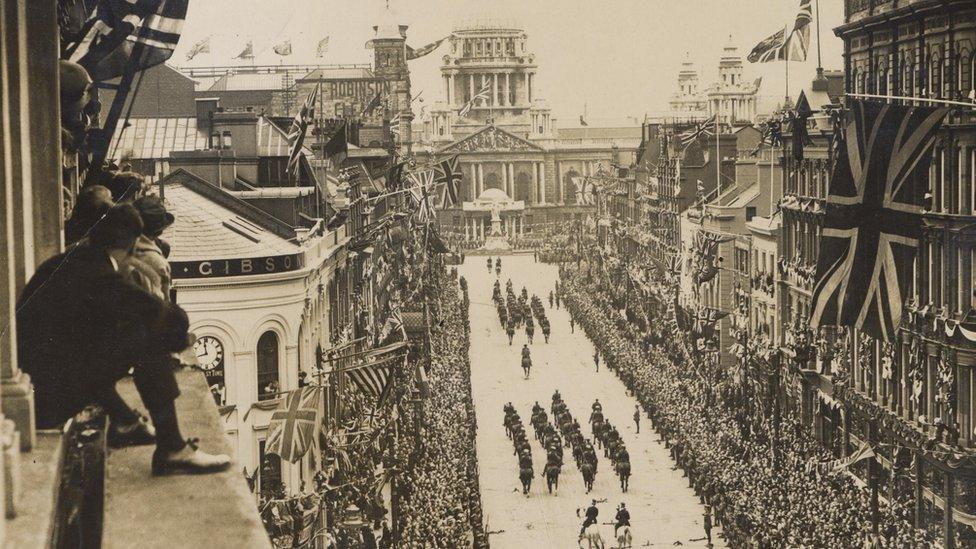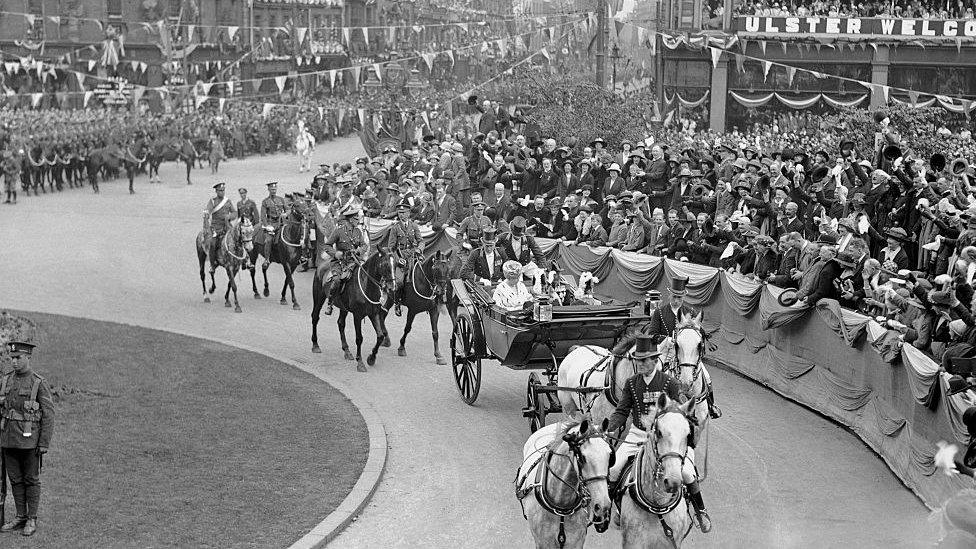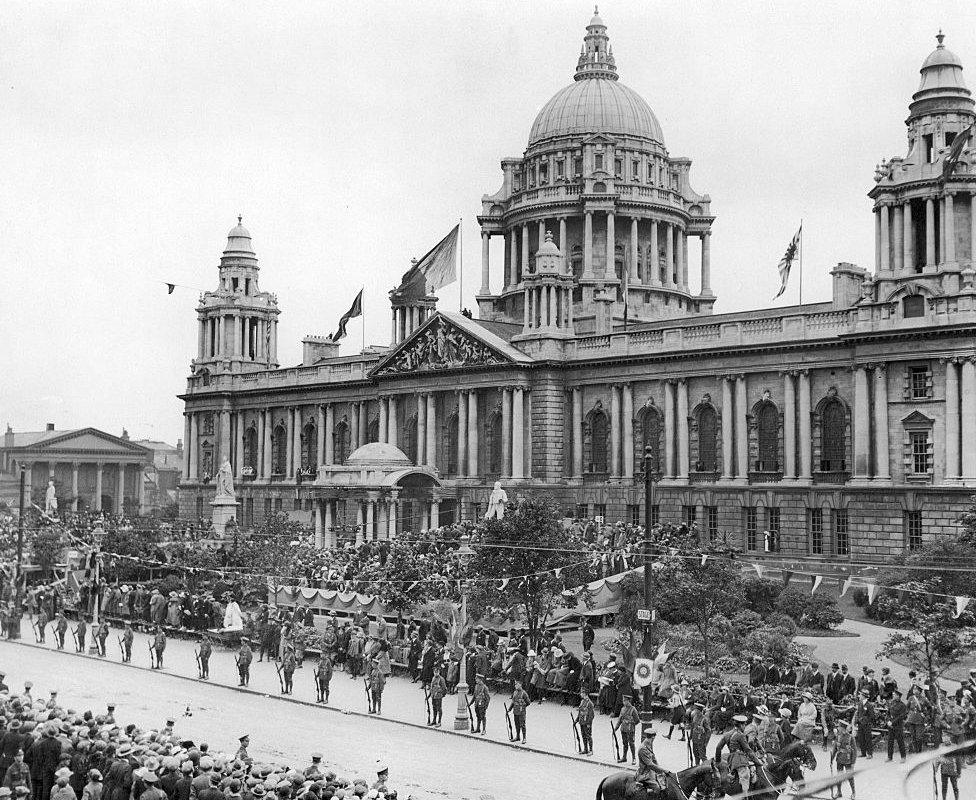NI 100: How the newspapers reported the King's visit in 1921
- Published

Huge crowds gathered to greet King George V in Belfast in 1921
The arrival of the King and Queen in Belfast on 22 June 1921 was accompanied by one of the greatest displays of pageantry ever witnessed in the city.
For the unionist population of the new state it was a day of celebration and gave Northern Ireland and its new institutions a royal seal of approval.
The city's unionist newspapers took the same view. The Belfast Telegraph, the News Letter and the Northern Whig all ran extensive coverage of the visit, with the Whig publishing a 12-page supplement on "Ulster's history".
The Irish News meanwhile, representing a nationalist viewpoint, was not so impressed.
It was a quick visit - lasting just four hours - in a tense atmosphere amid sectarian strife and the ongoing Anglo-Irish War.
The King travelled against the recommendations of his advisors, something remarked upon by the News Letter.
"If the gloomy prognostications of those people had been realised there would have been an acute feeling of disappointment amongst the loyalists of Belfast and the six counties," it noted.
The Northern Whig gave a blow-by-blow account of the trip, beginning with the royal yacht Victoria and Albert arriving at Donegall Quay.
When they exited the yacht the King and Queen were greeted by a 21-gun salute and a band played the national anthem before they made their way to Queen's Square and on to Belfast City Hall, where the parliament was assembled.
The unionist papers paint a sense of huge excitement in the city.

The King and Queen arrived by horse-drawn carriage
The News Letter reported: "The enthusiasm was infectious. All business was suspended for the day. At the shipyards there was an almost uncanny silence; the whirr of machinery ceased in the mills and factories; shops, offices and warehouses were closed; and the children revelled in the luxury of a holiday which, owing to its vivid associations, will remain with them as an abiding memory."
The Belfast Telegraph said that as the royal procession made its way along High Street: "The appearance of the royal coach provoked a demonstration of welcome such as Belfast has never previously witnessed. Hands, hats and flags were waved and the cheering continued until the entire procession had passed by."
Some onlookers, it was reported, had taken up their positions from 06:00, and photos from the day show huge crowds, with people sitting on high window ledges to catch a glimpse of the King and Queen.
As the Belfast Telegraph reported: "One man, sitting at a window, was so anxious to get a good view of the procession that he came out and stood on a narrow sill.
"Just as the Royal Coach was coming into view he slipped and fell right through the window, smashing a large pane of glass and missed seeing their majesties."
These papers also saw the huge crowds as a demonstration of the loyalty of the unionist population.
The Belfast Telegraph claimed: "In no part of his wide dominion is the King hailed with more fervour than in Ulster."
The News Letter wrote: "Those who witnessed yesterday's scenes could have no doubts as to the loyalty of the Ulster people."

Belfast City Hall was decked out for the state opening of Parliament on 22 June 1921
The Irish News was not unimpressed by the scenes, but was quick to point out that they did not change its view on what it described as the "Partition Parliament" or the new state of Northern Ireland.
It wrote: "From a spectacular point of view it was an undoubted success. Neither money nor pains were spared in the effort and on the whole the result was very good.
"The glamour of a Royal pageant, however brilliant, could not compensate for the absence of much that goes to make an occasion great and historic.
"A Parliament brought into being against the will of five-sixths of a nation can never be a historic institution."
It also carried several reports of sectarian tension in the city, claiming: "While the crowd generally abstained from scurrilous party expressions characteristic of Belfast mobs, there were here and there sections whose bigoted feelings could not be suppressed.
"At Castle Junction now and then a loyalist would call for [the song] the Boyne Water and one or two would join in."
'Not an honest word of hope'
The unionist papers also painted the King's visit as a commitment on his part to Northern Ireland's place within the United Kingdom and the British Empire.
The News Letter's view was that the visit was: "Rightly regarded as a striking proof of his deep interest in and affection for his loyal subjects in the north of Ireland, and no action on the part of the beloved monarch could have given more intense satisfaction to his people than this manifestation of his desire for their welfare at a time when they are taking upon themselves duties and responsibilities that will tax their wisdom, courage and endurance to the utmost."
The content of the King's speech to Parliament, which contained a plea for reconciliation and peace between unionists and nationalists, was reprinted by all the papers, but there was no analysis of its content, perhaps a reflection that at that time the monarch's words were not to be questioned.
The Northern Whig, however, hoped the establishment of the new parliament and the partition of Ireland by the Government of Ireland Act would have an abiding legacy.
It wrote: "Whatever that legislation may mean in the settlement of the Irish question as a whole, it has settled once and for all the Ulster question as a factor therein."
The Irish News also did not directly critique the speech in an editorial but it summed up the day in a headline as: "Four Hours of Pageantry and Feasting: Verbal Flummery: Not an Honest Word of Hope."

The BBC News NI website has a dedicated section marking the 100th anniversary of the creation of Northern Ireland and partition of the island.
There are special reports on the major figures of the time and the events that shaped modern Ireland available at bbc.co.uk/ni100.
Year '21: You can also explore how Northern Ireland was created 100 years ago by listening to the latest Year '21 podcast on BBC Sounds or catch-up on previous episodes.

Photo credit, top image: BELUM.Y22657, View showing crowds watching the Royal Procession approach the City Hall for the state opening of the first Northern Ireland Parliament 22 June 1921, Robert John Welch,(1859-1936), © National Museums NI, Ulster Museum Collection